
(Approx: 9 min read)
Picture the scene: It’s a freezing Monday morning as you get in to your car. Frost coats your windscreen, you’re already running late.
You turn the key/press the Start button… Nothing. Your car won’t start.
It’s an enormous inconvenience and can be hugely stressful for those that find themselves in that position… but don’t worry, because in this informative article we’ve got some simple tips to keep things running smoothly this winter. Plus, an explanation on how an extended car warranty can give you extra peace of mind through the challenging winter months.
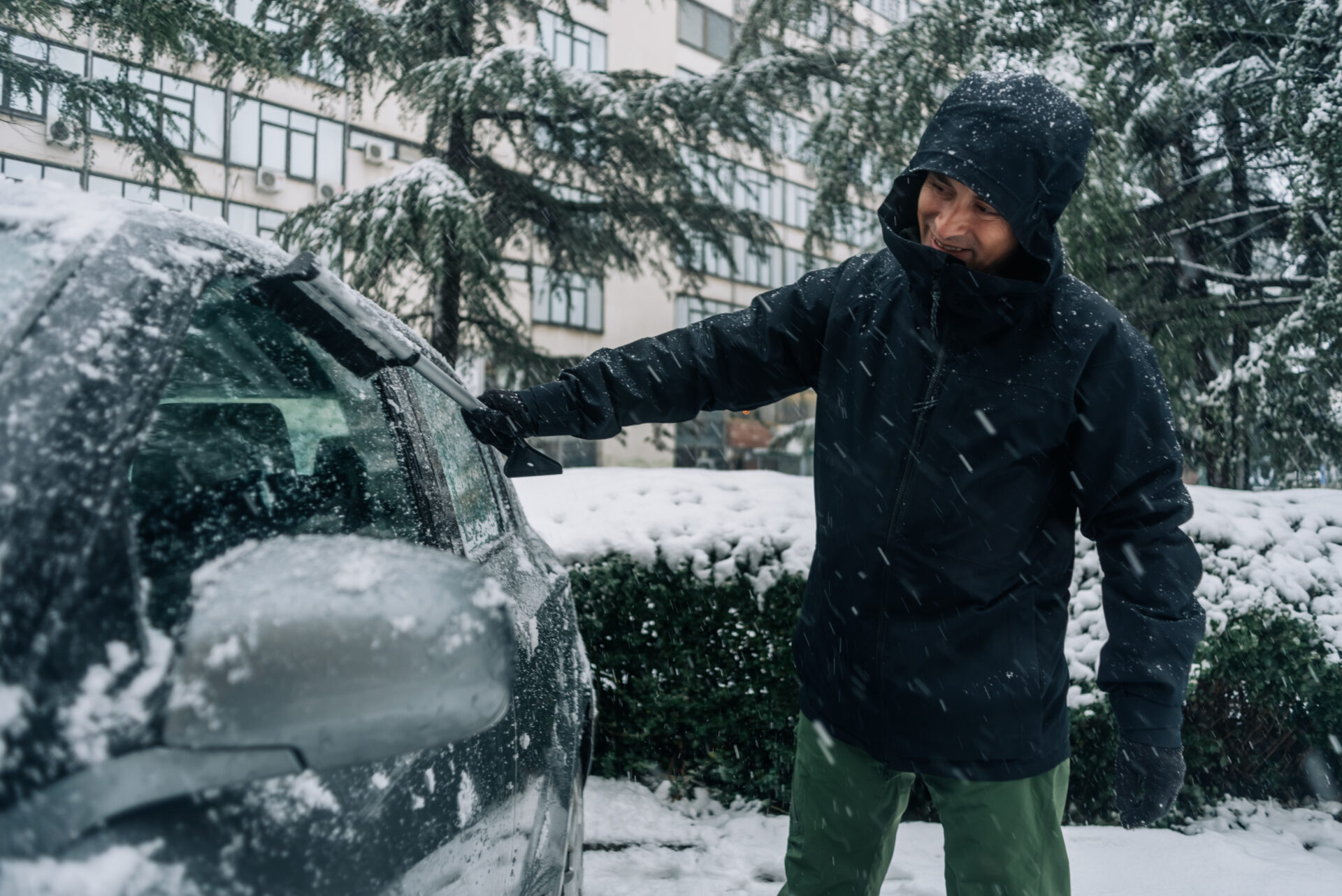
Key facts at a glance:
- According to the AA, 24% of winter callouts during winter are battery related.
- Another significant issue during winter months is the alternator due to the added demand on it by systems including heating and headlights.
- Small actions like double-checking your lights are off before exiting the vehicle can help keep your vehicle’s battery in good condition.
- Avoid using multiple ‘high-draw’ electrical accessories – such as air-con and powerful sound systems – at the same time, where possible.
- You should regularly (physically – under the bonnet) check your vehicle’s fluid levels.
- Good tyre condition and tread depth is essential for maintaining traction.
- Consider switching to winter tyres if travelling through ice and snow.
- Keep an ice scraper and de-icer available in the car at all times.
- Make sure you have an emergency breakdown kit in the vehicle; including a warm blanket, first aid kit and portable device charger. You should also consider keeping a portable battery jump starter on hand.
Winter can be tough on cars, especially if you’re driving a second-hand vehicle. Cold temperatures, icy roads and harsh weather conditions can all take their toll, leading to breakdowns, unexpected repair bills and a lot of unnecessary stress.
With a few simple checks and some regular maintenance, you can keep your car running smoothly, stay safe on the road and drive confidently all the way through the winter months.
Use the sections below to jump straight to what matters to you most, or read on for our full guide to preparing your car for winter:
Why does my car need extra attention during the winter months?
As temperatures drop and winter weather sets in, taking a little time to prepare your car for these changes can make all the difference between safe winter travels and being left stranded at the roadside.
Second-hand cars – particularly those without a recent service history or extended warranty – are especially vulnerable. Older parts may be worn, and any minor problems can quickly develop into significant issues when you factor in sub-zero temperatures.

Common winter vehicle issues and how to prevent them:
Exposure to cold temperatures can highlight underlying issues with your vehicle. What was “fine” just a few weeks ago can suddenly turn into an issue such as a flat battery, malfunctioning climate control systems, or a dashboard warning light overnight.
Here are some of the most regular winter repair requests we receive from our customers at Warrantywise, and tips on how to avoid them.
Malfunctioning or failed batteries:
| Winter issue: | How to stay prepared: |
|---|---|
| According to the AA, 24% of winter callouts are battery related. [1] | If you have a garage, use it. Storing your car away from freezing air can help protect the battery from harsh conditions. |
| Flat batteries are common due to cold weather slowing chemical reactions. | Always make sure all lights and electrical systems are switched off before leaving the car. This simple habit reduces the risk of flat battery overnight. |
| Older batteries are more likely to fail. | If your battery is older, or your car isn’t used regularly, consider using a trickle charger. |
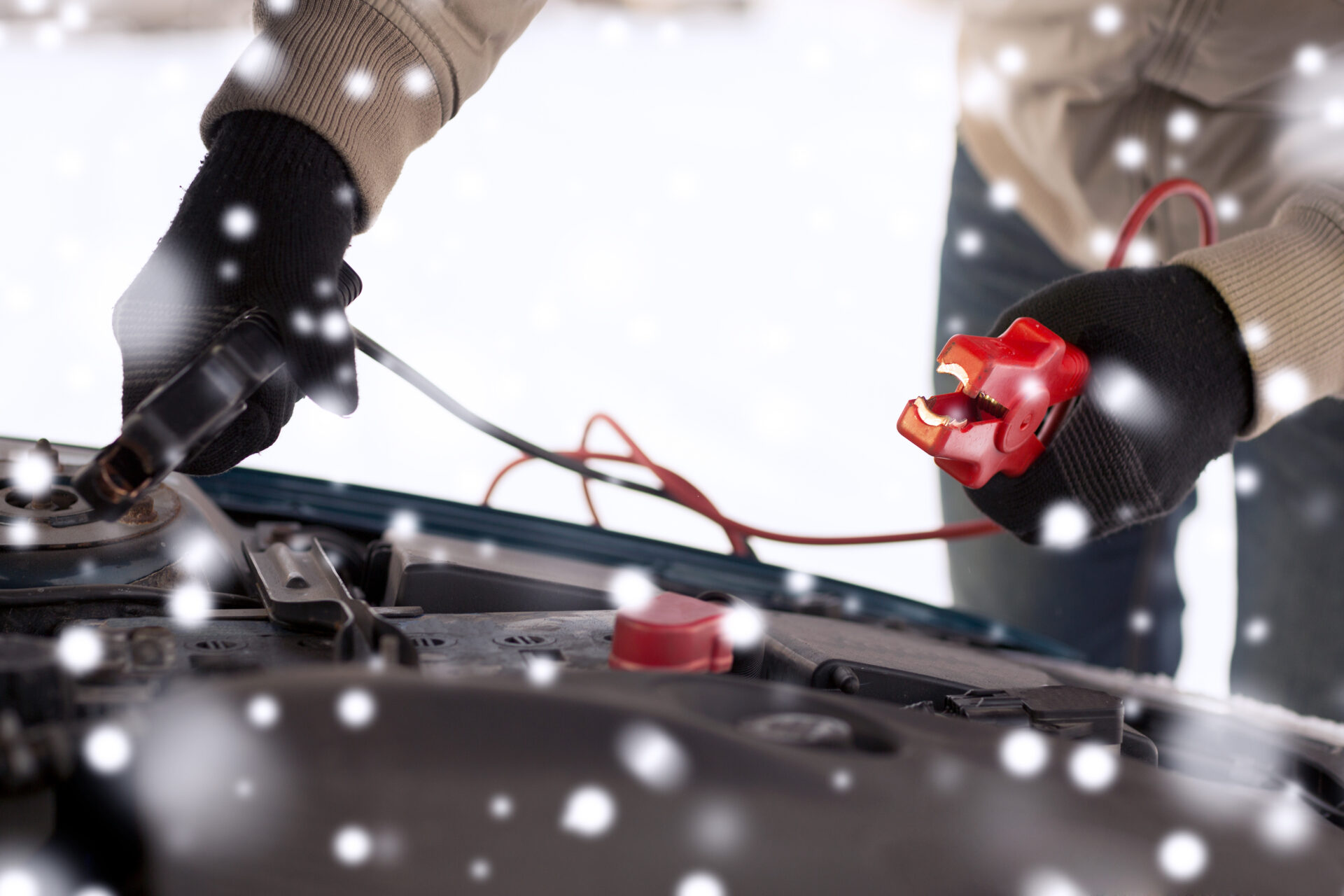
Why do car batteries fail in winter?
The main reason car batteries struggle throughout winter is that cold weather slows down the chemical processes inside the battery, reducing its ability to take and hold electrical charge. Older batteries are especially vulnerable to this, which is why winter breakdowns are so often battery-related.
If your battery is fairly new and you drive your car regularly, you shouldn’t need to worry too much about charging. If you’re uncertain, take a look at our guide: How often should I replace my car battery for more advice.
Extreme cold weather can significantly impact battery performance, making it one of the most common issues drivers face during the winter months.
Are batteries protected under our warranty?
No. Most extended warranties do not include batteries, as they are considered consumables with a limited lifespan.
However, when you book your car in for a routine service, battery checks are usually included. Keeping up with your manufacturer’s recommended service schedule is one of the best ways to ensure your car and its battery stay in top condition throughout winter.
Alternator & electrical system issues:
| Winter issue: | How to stay prepared: |
|---|---|
| Extra strain from heaters, defrosters, and lights. | Avoid using multiple high-draw accessories simultaneously. |
| Increased risk of alternator failure in cold weather. | Regularly check and maintain coolant levels. |

Why do alternators fail in winter?
Your alternator is a crucial part of your car’s engine system, transferring power from a running engine to power and charge various systems – including the battery. The alternator works much harder in winter; powering heaters, headlights and defrosters much more regularly and oftentimes simultaneously.
To help prevent problems, avoid using multiple high-draw electrical accessories at the same time unless absolutely necessary.
The heater core keeps your cabin warm, but low or poor quality coolant can cause it to fail. Regularly check and maintain coolant levels to prevent costly repairs.
NOTE: Electric vehicles (EVs) do not have alternators as they do not have an engine to power them. They instead use a DC-to-DC converter to perform the same task. However, this converter will also come under more stress in the winter months for the same reasons an alternator would, and cold weather restricts electrical flow throughout the EV’s systems.
Are alternators protected under our warranty?
Yes, alternators are protected on any Warrantywise warranty plan of Silver level or above (so Silver, Gold, Platinum and Platinum Plus).
Starter motor issues:
| Winter issue: | How to stay prepared: |
|---|---|
| Cold starts increase load on the starter motor. | Turn off non-essential accessories before starting the car. |

Why do starter motors fail in winter?
Cold starts put extra stress on your starter motor. Reduce the load by switching off non-essential electrical items like the radio and heater until the engine is running smoothly.
Are starter motors protected under your warranty?
Yes, along with the alternator, starter motors are protected on any Warrantywise warranty plan of Silver level or above (so Silver, Gold, Platinum and Platinum Plus).
Worn or unsafe tyres:
| Winter issue: | How to stay prepared: |
|---|---|
| Reduced grip on icy roads. | Invest in winter tyres and monitor tyre pressure. |

Why do tyres struggle more in winter?
Cold weather can make tyres lose pressure and grip, which means less control on wet or icy roads. Checking your tyre pressure and tread regularly helps keep you safe and your car running more efficiently.
If you do a lot of driving through ice or snow, winter tyres are a smart investment. They’re made from softer rubber and have deeper tread patterns, giving you better grip, shorter stopping distances, and more confidence when the roads turn slippery.
If you’re unsure of the condition of your tyre tread, we have a handy guide to the 20p tyre tread depth check below:
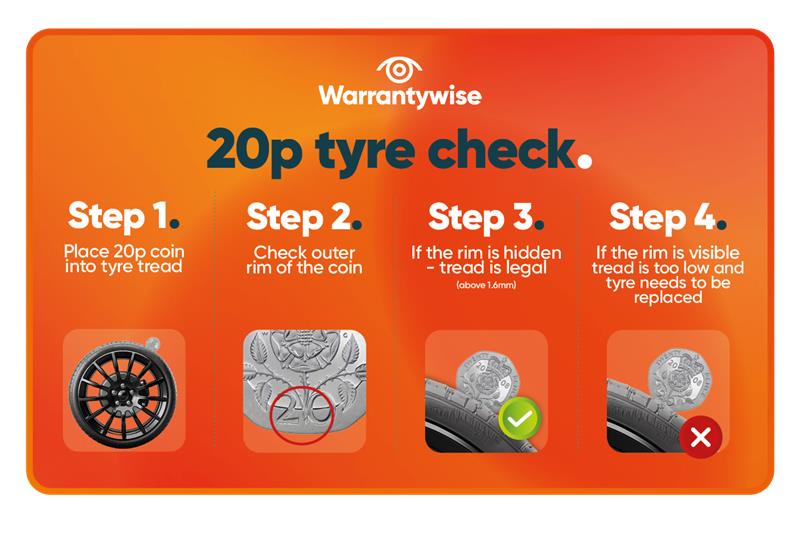
Winter considerations for electric vehicles:
Electric vehicles (EVs) are becoming more popular with drivers each year, and they face unique winter challenges.
If you are driving an EV this winter, here are some key considerations:
- Reduced range:
EV batteries operate less efficiently in cold weather, sometimes significantly reducing driving range.
- Slower charging:
Batteries charge more slowly in low temperatures, particularly at outdoor public chargers.
- Vehicle heating:
EVs rely on battery power to heat the vehicle, which can further reduce range.
If you’re worried about your EV during winter, you should consider a comprehensive EV warranty from Warrantywise. It provides protection for critical EV components such as the auxiliary battery, drive battery (EV Plus), onboard charger, AC power inverter, DC to DC converter, traction motor, power regeneration braking system, thermal cooling system, braking components, electrical systems and key fobs.
Optional additional protection can include items like airbags, air-conditioning, advanced driver assistance (ADAS) systems and emergency breakdown assistance, ensuring you remain protected.
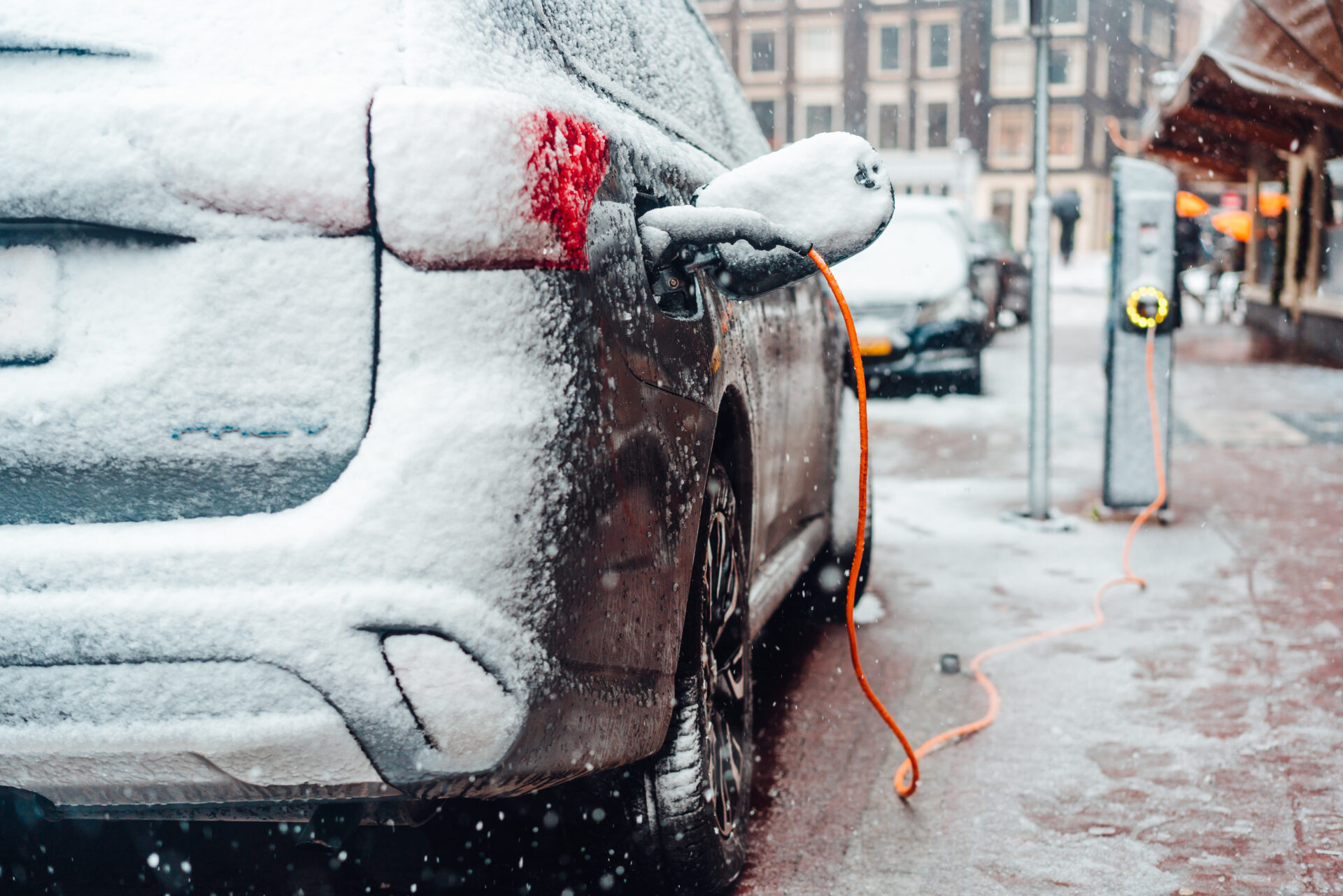
Top tips for getting your car ready for winter:
A reliable warranty is essential but combining it with proactive care is even better. Here are a few simple steps to take today:
- Check tyre tread and pressure, grip is vital on icy roads.
- Top up antifreeze and screen wash, these support visibility and engine protection.
- Keep your battery healthy; drive regularly, avoid letting your vehicle sit idle.
- Book a winter vehicle health check, many garages offer these seasonal inspections.
Don’t wait until the first cold snap to act – book a winter maintenance check with your mechanic to make sure your car is fully prepared for the winter months. From battery health to tyres and fluid levels, taking these steps now will help you drive with confidence, whatever the weather.
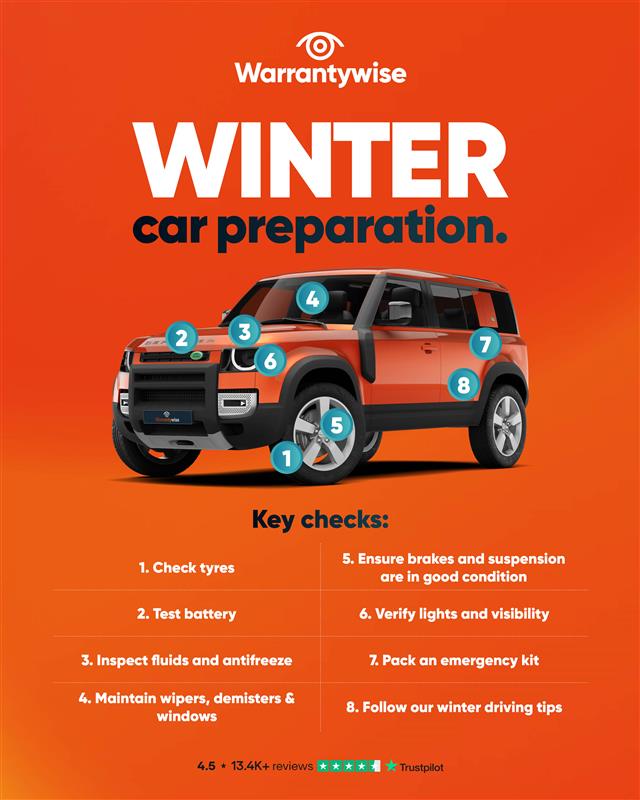
Winter visibility checks:
Ensuring you can actually see properly out of your car is essential for safe winter driving. Cold, wet and icy conditions make it even more important to prepare your car before setting off.
Visibility essentials:
- Top up washer fluid:
Always use a winter-grade washer fluid with antifreeze to prevent freezing.
- Check wiper blades:
Inspect for wear and replace them if they’re streaking or damaged.
- Carry de-icing tools:
Keep an ice scraper and de-icer spray in your car to clear your windscreen, mirrors and lights before setting off.
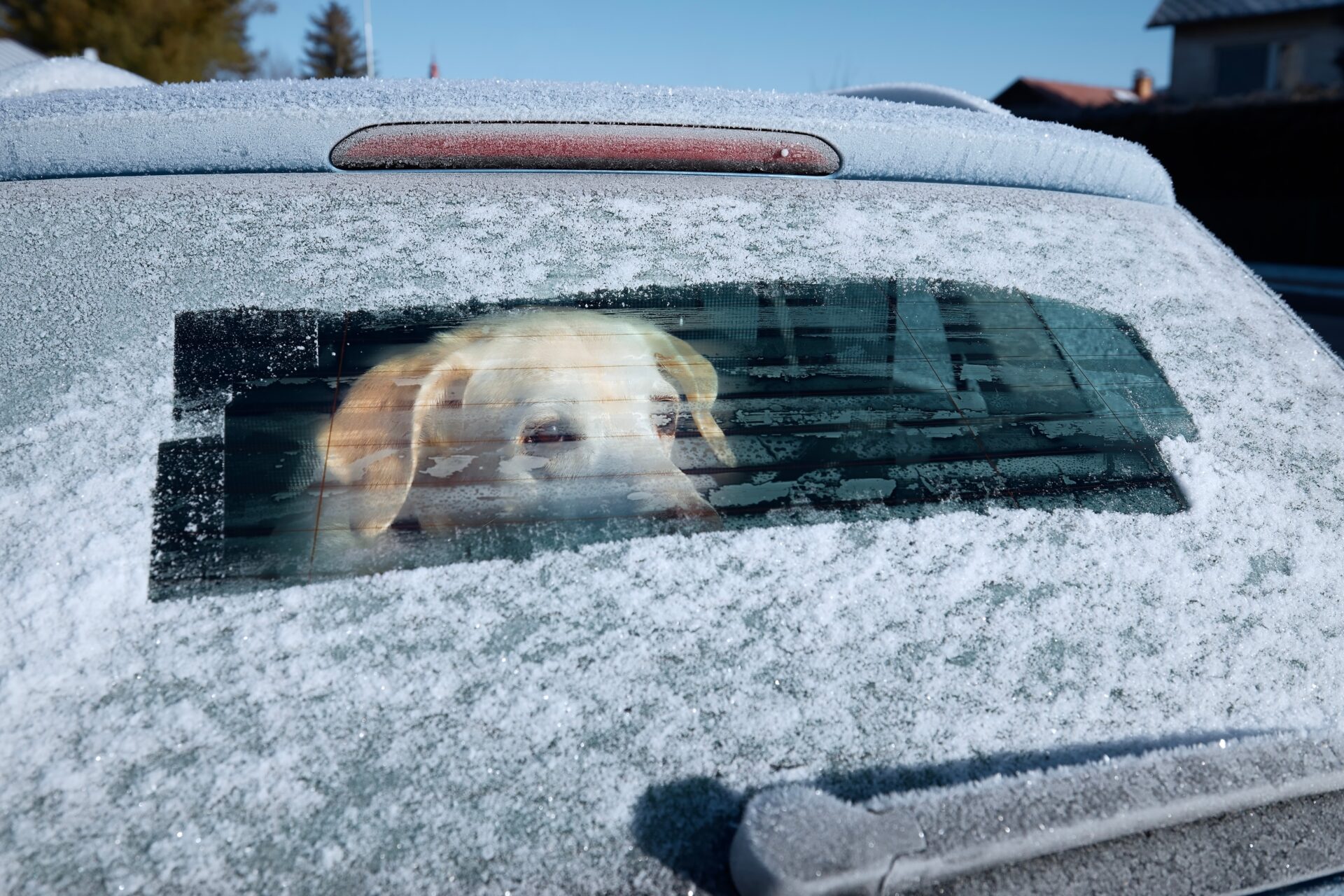
Engine oil:
- Park on level ground and make sure your engine is cool.
- Open the bonnet and find the dipstick (usually marked with a bright orange or yellow handle).
- Pull out the dipstick, wipe it clean with cloth or paper, then reinsert it fully.
- Pull it out again and check the oil level. The oil level should sit between the minimum and maximum marks on the dipstick.
- If it’s low, top up with the correct grade oil. You can find this information in your manufacturer’s booklet.
- The oil should appear smooth. If it’s black, thick or gritty, it might be time for an oil change.
Coolant:
- Make sure the engine is cold.
- Locate the coolant tank (usually a clear plastic bottle with ‘min’ and ‘max’ markings. Be careful not to confuse with the brake fluid reservoir).
- Check the level of the fluid – it should sit between two lines.
- If the level is below ‘min’, top up with the correct mix of coolant and water.
- The coolant should be brightly coloured. If it’s brown or rusty, get it checked by a mechanic.
Brake fluid:
- Find the brake fluid reservoir – usually at the back of the engine on the driver’s side.
- The reservoir is small and has ‘min’ and ‘max’ markings.
- Check that the fluid level sits between these two marks. If it’s below ‘min’, do not top up yourself. Low brake fluid can indicate a leak or worn brake pads and should be checked by a professional.
- Brake fluid is highly corrosive and can damage paintwork, plastic and rubber surfaces. Additionally, its moisture may react with metal parts, leading to rust and deterioration.
Screen wash:
- Open the screen wash reservoir, usually marked with a blue cap showing a windscreen or water symbol.
- Pour in ready-mixed screen wash solution until it’s filled nearly to the top.In winter, use winter-grade screen wash to prevent freezing.
- Avoid using plain water as doesn’t clean as effectively, and it can freeze in cold weather.
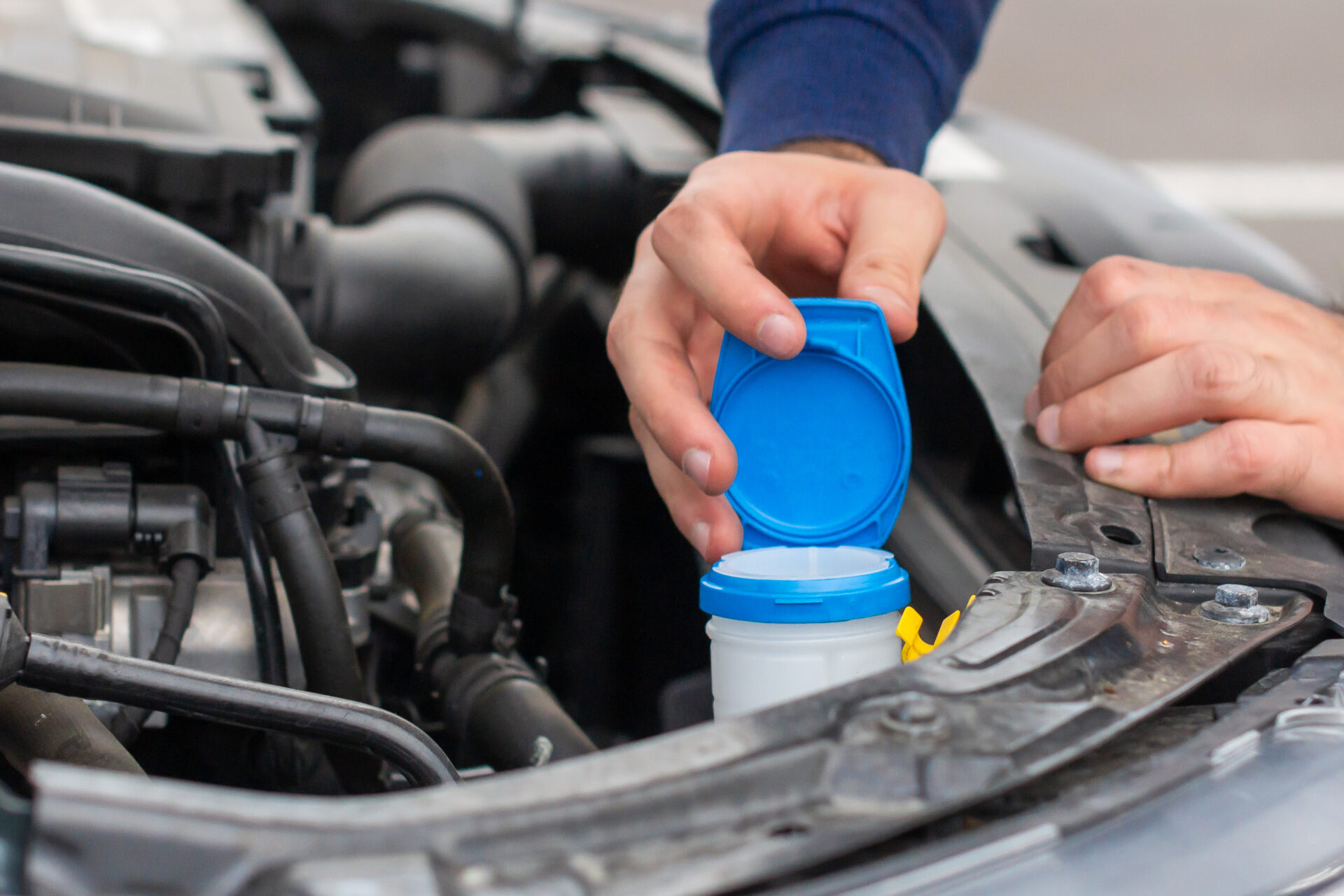
Why washer fluid matters even more in winter:
Roads are often gritted during winter, which can quickly leave your windscreen coated in grime. If your washer fluid freezes, you won’t be able to clear it, leaving you with dangerously poor visibility. Always make sure your washer fluid contains antifreeze.
Your washer fluid will usually be topped up at your annual service, but it’s best to check before winter sets in. Simply open the bonnet and look for the cap with the windscreen icon to refill as needed.
Winter driving emergency kit – what to keep in your car:

Even with the best preparation, extreme winter weather can still catch drivers out. Keeping an emergency kit in your car ensures you’re ready if you get stuck or face unexpected delays.
Emergency winter driving kit:
Each of the items below is an external link to the product, so you can start to prepare your kit straight away.
By keeping all of these things in your boot and on your phone, you’ll be better prepared for the challenges of winter driving in the UK.
Why choose Warrantywise this winter?
Not all warranties are the same, and never is that more true than during winter. Here’s why thousands of UK drivers choose Warrantywise:
- Transparent warranty levels, so you know exactly what is included.
- Tailored plans with the highest level of warranty for your make and model – whether you’ve got a hybrid, EV, or a petrol/diesel engine.
- Award-winning service, supported by genuine customer reviews.
- Optional add-ons, including emergency breakdown assistance, car hire, and onward travel.
- Friendly warranty experts who are here to help you when you need us.

Drive with confidence, every winter:
With increased electrical demand and higher chances of mechanical faults, the risk of unexpected breakdowns rises during the colder months. Adding a layer of financial protection with an extended car warranty can give you peace of mind if the worst happens.
Winter does not have to be a season of heightened stress behind the wheel. Whether you are commuting to work, doing the school run or heading home for Christmas, being winter-ready means driving with confidence. With a tailored car warranty from Warrantywise, you can enjoy peace of mind this winter, knowing your vehicle is protected.
From EV-specific to traditional petrol/diesel vehicle plans, you will find options that fit both your requirements and your budget. Protect yourself from unexpected repair costs this winter and explore our tailored car warranty plans now.
Discover more.
Further Warrantywise articles you might find useful…

This is how often you should replace your car battery.
When you’re shopping for a new car, which features do you pay the most attention to? Most of us judge … Continued

6 essential fluids that keep your car healthy and how to maintain them.
Keeping your car’s fluids at the right levels is essential for performance and longevity. From engine oil and coolant, to … Continued

How to save money by caring for your car.
With fuel prices, repairs, and car costs rising, saving money on your vehicle has never been more important. The good … Continued